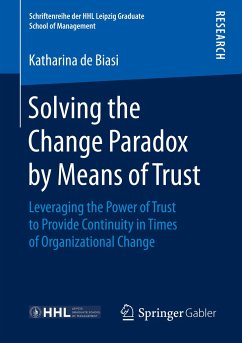
Organizational Ikigai
Theoretical Foundations for the Transformation to a Purpose-driven Organization

PAYBACK Punkte
29 °P sammeln!
Organizations are increasingly faced with the challenge of recruiting and retaining suitable personnel. It is crucial to have employees who are committed to their organization and actively support change. Such commitment is primarily present when employees find suitable framework conditions for themselves that result from the lived values that are anchored in the organizational culture. Accordingly, a culture must be based on an image of human man that is worthy of man.An image of man worthy of man is reflected in Ikigai. Ikigai pursues a meaning-centered approach (purpose-driven) and - based ...
Organizations are increasingly faced with the challenge of recruiting and retaining suitable personnel. It is crucial to have employees who are committed to their organization and actively support change. Such commitment is primarily present when employees find suitable framework conditions for themselves that result from the lived values that are anchored in the organizational culture. Accordingly, a culture must be based on an image of human man that is worthy of man.
An image of man worthy of man is reflected in Ikigai. Ikigai pursues a meaning-centered approach (purpose-driven) and - based on the original logotherapy of Viktor E. Frankl - assumes that the core motivation of human beings is the search for meaning.
The book lays the theoretical foundation for a comprehensive individual and organizational consideration of Ikigai by describing Ikigai as a Japanese philosophy of life and, on the basis of original logotherapy, opening up Ikigai for the non-Japanese cultural area. The necessity of a purpose driven view is explained and individual Ikigai is transferred to the organizational context as a blueprint. The four central levers of organizational Ikigai are described and the theoretical foundations for a transformation to a purpose-driven organization are presented.
An image of man worthy of man is reflected in Ikigai. Ikigai pursues a meaning-centered approach (purpose-driven) and - based on the original logotherapy of Viktor E. Frankl - assumes that the core motivation of human beings is the search for meaning.
The book lays the theoretical foundation for a comprehensive individual and organizational consideration of Ikigai by describing Ikigai as a Japanese philosophy of life and, on the basis of original logotherapy, opening up Ikigai for the non-Japanese cultural area. The necessity of a purpose driven view is explained and individual Ikigai is transferred to the organizational context as a blueprint. The four central levers of organizational Ikigai are described and the theoretical foundations for a transformation to a purpose-driven organization are presented.












